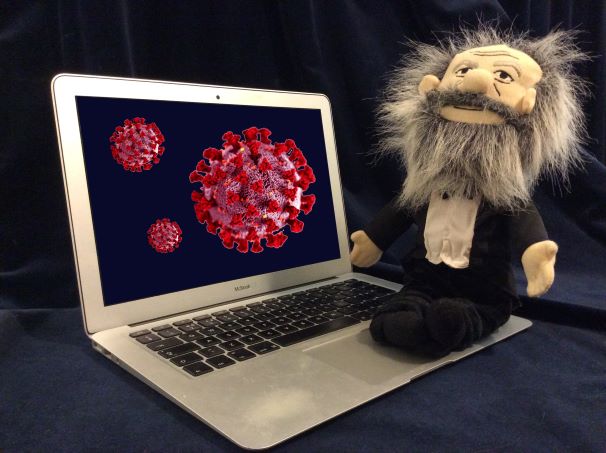What implications does COVID-19 have for the future of capitalism? In the first of a series of blog posts, Professor David Bates suggests that the current COVID-19 shock is likely to produce a new and increasingly exploitative form of ‘self-regulatory’ capitalism; yet it may also open up a new line of questioning against the current global economic status quo, in which the balance between employers and employees starts to be reset.
In its early nineteenth century manifestation, capitalism was yet to become the totalising system which Karl Marx did so much to theorise in his magnum opus, Capital. The technological advances of the industrial revolution had led to an enormous expansion of mass scale industrialised production. Yet, until the middle of the nineteenth century, many of the labours essential to this process continued to be carried out in the home. This is usually referred to by social and economic historians as the ‘putting out system’. Technologies in certain areas of the production process lagged behind others, ultimately slowing down overall industrial output, and hence the accumulation of value.
From the middle of the nineteenth century, Marx argued that we started to see the ‘real subsumption’ of labour by capital. Mechanisation put what seemed to be the final nail in the coffin of the putting out system. This was to become the epoch of what has often been termed ‘organised capitalism’. The most well-known ideological expression of this moment was Frederick Taylor’s ‘scientific management’, which aimed to provide bosses with ways to control the worker from clock on to clock off.
The shock of the global oil and consequently financial crisis of the early 1970s presented the possibilities of a final break with organised capitalism; capitalism now came to take a ‘disorganised’ form. Capitalists mobilised the shock of this crisis to further capitalise on advantage. The factory with thousands of workers – the key site of labour organisation –was displaced by a proliferation of small and ‘flexibly specialised’ units of production, coupled with mass unemployment (at least in the West). The rights of workers were reduced as their powers were eroded.
The networked information revolution from the 1990s onwards turbocharged flexible specialisation. The balance of production in capitalism – so the argument goes – shifted from material to immaterial labour (that is the production of ideas and affects, rather than tangible ‘things’). Not all such production needs to occur inside the factory walls. In some sectors of the economy, we have witnessed a shift back to the home as a loci of production.
But this is not simply a reboot of the previous system of putting out. With that system, the factory continued to need a previously configured household as a unit of production. Neo-liberal capitalism transformed the whole of social life into a factory. The labour output of information workers can be regulated and controlled through dashboards, and other on- line clock in mechanisms. Such mechanisms in effect create forms of self- regulation; data ‘transparency’ enables workers to monitor one another’s performance, where performance = outputs.
If you are interested in these issues, why not check out our Politics programme, where I teach on our undergraduate and postgraduate degrees?
Nevertheless, before Covid-19, capitalism had not exploited fully the potential of such self-regulation. It takes a great deal of faith on the part of employers to contract out labour regulation to the workers themselves. The shock of Covid-19 turned the globe into an economic laboratory for self-regulatory capitalism. The advantages for employers are clear: if plant and labour costs are the two largest expenses of any business, then a significant reduction in these costs will enhance profit margins. Indeed, it may be the case that employers can sustain margins, with a substantial reduction of outputs. The advantages for employees however are not so clear. First, employers simply transfer plant costs onto their employees. Second, if productive output is reduced, there is likely to be an over-supply of workers in the labour market, which in turn leads to a downward pressure on wages. Third, a reduction in output will likely increase the costs of individual commodities, and hence consumer costs.
But this may also represent a revolutionary moment. Knowledge workers are likely to ask a simple question – how is my employer contributing at all to the value I am creating? Why would they not then question the very need for an employer?
Marx famously characterised the transformative power of capitalism when he commented in the Communist Manifesto that ‘all that is solid melts into air’; he went on to say: ‘all that is holy is profaned, and man is at last compelled to face with sober senses his real conditions of life, and his relations with his kind.’ What an apt statement of our present predicament.
Professor David Bates is Professor of Contemporary Political Thought in Politics and International Relations at Canterbury Christ Church University. His research is focused primarily in the area of contemporary radical political thought, in particular, the constitution and refusal of forms of social and political subjectivity and particularly in artistic practice and transformations of labour in contemporary society. He teaches modules on our undergraduate and postgraduate degrees and welcomes applications from PhD students interested in pursuing similar research themes.
 Politics
Politics Laura Cashman
Laura Cashman 1119
1119


